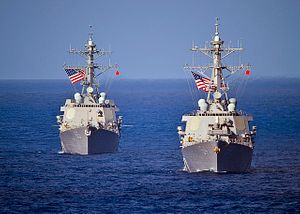In its courageous and comprehensive decision on the South China Sea, the arbitration tribunal appointed by the Permanent Court of Arbitration has rendered an invaluable service to the region and the international community.
It has established an international law overlay to China’s sweeping territorial and maritime claims and thereby provided important guidance for all six competing claimants.
Hopefully, the decision will be a wake-up call for China’s leaders—a deus ex machina that opens a way out of the predicament they have created for themselves. China is at a decisive point in its history. It can continue on the path of defiance and disdain toward the international legal system and return China to the kind of angry isolation Richard Nixon described in 1967: a China “outside the family of nations, nurturing its fantasies, cherishing its hates, and threatening its neighbors.”
Or Beijing can man up, swallow a little pride, and win accolades of international praise, respect, and appreciation by accepting the tribunal decision and working cooperatively within ASEAN and other regional institutions for the peaceful accommodation of every country’s interests.
Foregoing China’s sweeping maritime claims would also eliminate the potentially confrontational aspects of America’s FONOPS in the South China Sea, highly constrained as they have been so far. Beijing’s claims are no longer even historically colorable after the tribunal’s sweeping findings and rulings.
But whether China cooperates or not, the arbitration decision affords the United States a unique opportunity to correct its own earlier mistakes in ensuring navigational freedoms.
For two years, China dredged sand from the sea bottom, piled it onto rocks and reefs, and built artificial islands to fill in the dashes in its nine-dash line claim to virtually the entire South China Sea. Contrary to Xi Jinping’s representations to President Barack Obama at their California summit last year, China continued to construct runways and military facilities on those newly-created land features.
All the while, American officials joined others in protesting China’s expansionist actions while standing passively by. Last October, the United States finally moved to assert its right of freedom of navigation by dispatching the USS Lassen within twelve nautical miles of five features in the Spratly Islands claimed by China.
In January, the Curtis Wilbur did the same off Triton Island in the Paracels, and in May the William Lawrence steamed within twelve nautical miles of Fiery Cross Reef in the Spratlys.
All three ship transits were intended to enforce the claims by Secretaries Ash Carter and John Kerry and other officials that “the United States will fly, sail, and operate anywhere that international law allows”—but all three failed to meet the operating part of that standard.
While technically freedom of navigation operations (FONOPS) within Washington’s very broad definition, they deliberately did not challenge China’s sovereignty claims, only the “requirement” of notice.
All three limited FONOPS were merely exercises of innocent passage, a law of the sea concept that applies to transits within a country’s implicitly acknowledged territorial waters. By deactivating their radar systems and avoiding exercises or tactical maneuvering, the U.S. Navy ships did not act as if they were operating on the high seas as Washington claims it is doing. China protested anyway but must have welcomed the unintended territorial concessions.
Now that the tribunal has demolished even the patina of China’s legal/historical claims to the international waters of the South China Sea, Washington should act as decisively and confidently as did the brave jurists on the tribunal. Beijing should accept regular, unconstrained FONOPS not as provocations but as the normal routine on the high seas as affirmed by the arbitral tribunal.
Joseph A. Bosco is a member of the U.S.-China task force at the Center for the National Interest and a nonresident senior associate at the Center for Strategic and International Studies. He previously served as China country desk officer in the office of the secretary of Defense from 2005-2006.































